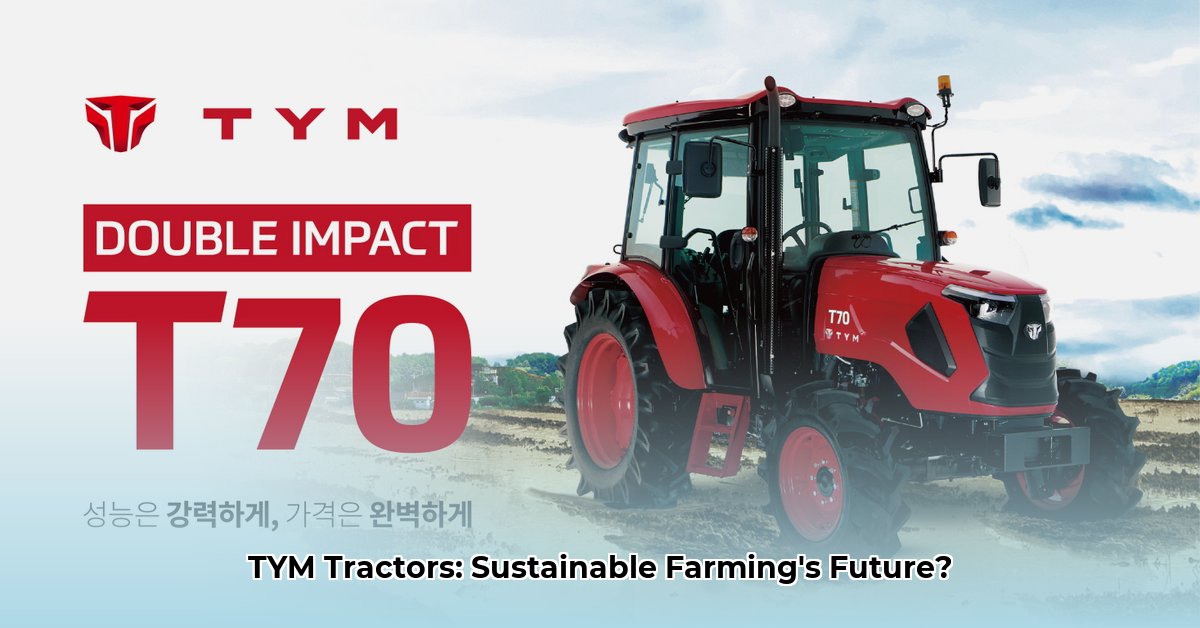
Affordability and Environmental Impact: A Balanced Equation?
TYM tractors often present a compelling proposition: affordability without entirely sacrificing sustainability features. Their lower price point compared to brands like Kubota and John Deere makes them attractive to budget-conscious farmers. However, "sustainable farming" encompasses more than just eco-friendly features. Long-term reliability and operational efficiency also significantly contribute to sustainable farming practices. TYM's Tier 4 engines, designed for reduced emissions, certainly contribute to the environmental aspect. Moreover, features like independent PTO systems enhance efficiency, enabling farmers to accomplish more with less fuel consumption. But is this enough for long-term success? For more tractor comparisons, see this helpful resource: tractor comparisons.
Is a lower initial cost offset by potential long-term repair expenses? This is an essential question to consider.
Field Performance: Strengths and Limitations
Many TYM owners report satisfactory performance for lighter tasks such as tilling smaller plots, mowing fields, and snow removal. Their maneuverability, especially in models with hydrostatic transmissions, often receives praise. But heavier-duty work presents a different picture. Several reports indicate potential underpowering for large-scale operations, such as plowing extensive fields or hauling heavy loads. This highlights a crucial point: a tractor too small for the workload can lead to inefficiencies and increased expense in the long run.
Does the TYM's agility outweigh its power limitations for your specific needs?
Dealer Support and Warranty: A Significant Variable
A significant area of concern revolves around the consistency of dealer support and warranty experiences. While TYM offers warranties, the actual process of resolving issues shows considerable variability. This inconsistency represents a substantial risk, as delays in repairs can severely disrupt farming operations. Before investing in a TYM, it is imperative to meticulously research the reputation of your local dealer by speaking directly with other customers.
Given the disparate experiences, how can a potential buyer effectively assess the reliability of their local TYM dealer before purchase?
Making the Right Choice: A Decision-Making Checklist
To aid your decision-making process, let's summarize the advantages and disadvantages:
Pros:
- Budget-Friendly: Generally lower purchase price than major competitors.
- Environmentally Conscious: Tier 4 engines reduce emissions.
- Excellent Maneuverability: Easy handling and control, particularly in hydrostatic transmission models.
- Suitable for Smaller Farms: Ideal for lighter tasks and less demanding operations.
Cons:
- Inconsistent Dealer Support: Reports of varied experiences with dealer service and warranty claims represent a significant risk.
- Limited Power for Heavy Work: May not be adequately powered for large-scale or heavy-duty farming.
- Potential Parts Availability Issues: Acquisition of replacement parts may prove challenging in some regions.
Minimizing Risks: A Step-by-Step Guide
To mitigate potential problems, follow these steps:
- Thoroughly Investigate Your Local Dealer: Visit the dealership, and speak with existing customers to gain firsthand insights into their service experiences.
- Carefully Review the Warranty: Understand the warranty's terms and conditions, including exclusions. Ask specific questions about coverage details and the claim process.
- Realistically Assess Your Farming Needs: Honestly evaluate your farm's scale and workload to determine whether a TYM tractor will provide the performance you need.
- Compare Across Brands: Don't limit your research to TYM. Compare features, performance, and dealer reputation of various tractors within your budget.
The Verdict: A Context-Specific Assessment
Ultimately, whether a TYM tractor is "good" depends entirely on your individual circumstances, priorities, and farming operations. For smaller farms with a limited budget where environmental considerations are important and a dependable local dealer is available, a TYM might be a suitable investment. However, the potential for service and parts-related issues should never be dismissed. Thorough research and careful consideration are vital before making a purchase commitment. Remember, reliable equipment and timely service are paramount for productive and truly sustainable farming.
Mitigating Warranty and Dealer Support Challenges: Proactive Strategies
Key Considerations:
- TYM's warranty, while seemingly comprehensive, possesses significant exclusions for certain components (batteries, tires).
- Numerous farmer accounts highlight substantial delays in obtaining parts and repairs.
- Proactive measures, both before and after purchasing, are crucial to address potential service and warranty problems.
- Thorough dealer investigation is essential.
- Documentation of all communications, service requests, and repairs is vital for successful warranty claims.
Steps to Minimize Risks
Before Purchase:
- Conduct Extensive Dealer Research: Verify the dealer’s reputation, longevity, and parts availability.
- Pre-Delivery Inspection (PDI): Document the tractor's condition with photos and notes before accepting delivery.
During Ownership:
- Maintain Meticulous Records: Keep thorough documentation of every interaction with the dealer and TYM, including maintenance, repairs, and warranty claims.
- Perform Scheduled Maintenance: Adhere strictly to the manufacturer's recommended maintenance schedule.
If Problems Arise:
- Escalate to TYM Customer Service: If dealer responsiveness is unsatisfactory, contact TYM directly.
- Seek Legal Counsel (if necessary): If all efforts fail, consult a legal professional specializing in agricultural equipment warranties.
The Dealer Network: A Critical Link in the Chain
The inconsistent dealer support experiences highlight serious issues within TYM's dealer network. A robust support infrastructure is paramount for ensuring customer satisfaction and upholding warranty commitments. TYM needs investment in dealer training, retention programs, and more reliable parts distribution to truly support their customers.
Sustainability and Long-Term Viability
While TYM offers a more affordable entry point into modern farm technology and boasts some eco-friendly features, potential service issues necessitate prudent consideration. Sustainable agriculture requires reliable equipment with minimal downtime; extended repairs directly contradict this principle. The long-term financial implications of equipment downtime must be factored into any farm’s sustainability plans.